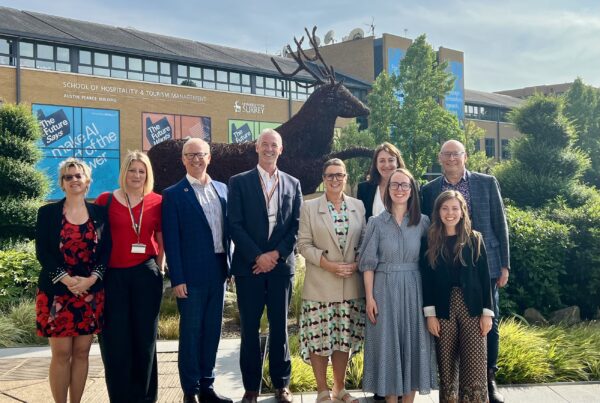Learning innovation ecosystems, communities and partnerships
A great trigger to many successful businesses and start-ups, including in the technology and education fields, arises from founders and innovators with a strong personal passion driven by their formative experiences. Such a foundation for entrepreneurship is often complemented by how these experiences shape approaches to leadership.
There is nothing like being thrown in the deep end, or overcoming adversity or a challenging start, in developing resilience. Acceleration in lessons gained through this experience, has the potential to shape the way we lead and for it to endure.
The combination of entrepreneurial passion and leadership resilience can add up to strong starting points as a platform for adopting innovative approaches to future business needs and opportunities. By contrast, there is often a real challenge for traditional, established, and prestigious providers in markets, to have to work hard to maintain an edge of purpose and resilience that leads to competitive approaches against new start-ups and disruptors.
Leaders often see quality and value in what they recognise as being like them and it is unsurprising that eco-systems and communities of start-ups often co-locate or form like-minded partnerships. In the same way, traditional and conservative leaders and enterprises are more likely to see value in each other and tend to similarly co-locate or form their own communities and partnerships.
In higher education innovation, there is a real tension in these matters. The challenge is to try and get these two different forms of eco-system and community to interact and come together. This calls for explicit and deliberate efforts at partnership and community building and specific efforts towards incubating a rich and diverse mix of thinking and expertise.
This sort of innovation culture-building activity presents a great opportunity for universities. It is done commonly in areas of research commercialisation. It has been well-documented in places such as California’s Silicon Valley but also in the Oxford-Cambridge-London golden triangle in the UK, and in Israel and other centres.
Creating such eco-systems, communities and partnerships around teaching and learning innovation is less common. There is a strong and growing need and opportunity for our universities to build ecosystems and partnerships to pursue incubators for new approaches to learning. There is every opportunity and likelihood that it will impact and be required by the future of learners in a new learning economy.
A great example of this is happening at the Melbourne Business School (MBS) and we discussed the principles behind that and how it connects with new opportunities with AI to serve the skills needs of the future of work in a HEDx podcast episode last week, which you can access here. We look forward to co-hosting a series of HEDx episodes in the coming months where we will bring other guests as partners and parts of that eco-system to share their experiences of the journey towards learning innovation and future of work readiness.
The MBS Learning Innovation Hub has been formed with the support of a prestigious institution, its community, and its governance structures. It aims to serve the evolving needs of a well-established learning provider (and its clients and students) that sees itself as delivering learning by business, for business.
It has formed from within traditions of residential postgraduate and executive education offerings, associated with one of Australia’s oldest universities, in a community of long-established and blue-chip business partners. But it has explicitly and deliberately sought to break the mould of those origins by building new connections with EdTech and other start-up innovators. It has an explicit purpose of bringing together future of learning trailblazers, and operates as an edgy, innovative, and disruptive unit, driven by technology and new ways of learning.
Under the banner of MBS& it is seeking to extend the traditions and current offerings of a sector-leading business school and create a start-up like activity and focus within an established operating model and organisation.
It aims to embrace new pedagogies, technologies, business models and learning products and has launched the first innovation initiative to market this year.
That initiative is a future of learning incubator, a 12-week program which brings together learning experts, businesses, government, and the tech sector to align around big problems in the future of learning. This collaborative incubator has yielded 5 prototypes for products that directly solve for big problems such as skill shortages. Work is underway to now build out the prototypes into concrete products for the MBS& stakeholders.
In an unusual move for the education sector, MBS& is sharing all of its efforts (even commercial ideas) transparently with its community, aware that the challenges facing the education sector cannot be solved by one institution in isolation, and with the hope that deep collaboration will stand a stronger chance of advancing new approaches to learning and skill-building that directly tackle the needs of employers and the Australian economy.
That said, innovation journeys, especially for premium institutions, are fraught with challenge and come with serious change management requirements. One of the factors bolstering the disruptive efforts of MBS& is that it takes place within a broader transformation journey for the Melbourne Business School. It has recently released its online brand (MBS Online), offering online short courses, digital academies and online degrees fit for a digital skills economy. It has also made strong forays into premium learning technologies, having recently become the first Australian institution to launch the virtual classroom, a state of the art technology which mimics the theatre and immersiveness of the executive, residential-style education that it was always known for.
That transformation journey is spearheaded by a new breed of leaders and innovators who have a clear sense of purpose and contemporary approaches to leadership that arise from their formative experiences. And that journey is a bold, adventurous, and ambitious one, intentionally different in its approach to using incubators, partnerships, and a start-up mentality to ensure it builds from its tradition and prestige in ways that ensure it is competitive in a fast-changing sector and time.
First published in Campus Review on 14th August 2023.
Emeritus Professor Martin Betts, Co-Founder of HEDx
Dr Nora Koslowski, Chief Learning Innovation Officer, Melbourne Business School









